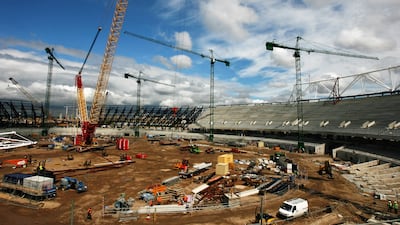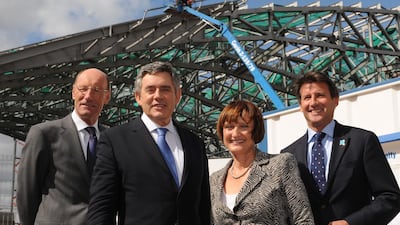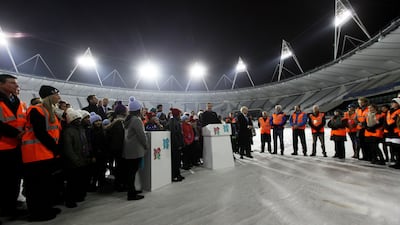On a warm afternoon in July, there are sunbathers lounging beneath the Olympic rings, children dancing with make-believe pirates, some tireless souls playing table tennis and the old Olympic swimming pool booked up in the summer heat, all on what was a patch of industrial wasteland until the Games came to London 10 years ago.
This is soil drenched with memories; the Olympic Park where a madcap opening ceremony beguiled and bewildered the world in equal measure, where the likes of Mo Farah and Jessica Ennis-Hill etched their names forever into British sporting folklore.
But new memories are being made. The Commonwealth’s best cyclists are about to get into gear here, a halal food festival is coming up, and the venue for the pioneering ABBA comeback is just down the road. Those who live in one of 11,000 homes by the park have seen the “10 years on” banners hanging up since the spring.
Before the Olympics, “it was a place where nobody would want to go at night,” said Peter Tudor, head of venues at the London Legacy Development Corporation. “Now: six million visits a year and beautiful green parkland that was a lifesaver during the pandemic.”
Not everyone is celebrating. For some, the £9 billion ($11bn) Games were a London-centric two-week extravagance. Others say regeneration went too far and that this part of East London is too upmarket for its own good.
And for a certain type of liberal Londoner, the memory of 2012 is tinged with sadness because the upbeat, modern image that Britain displayed that summer was not to last once Brexit divided the country.
But it is hard to doubt that much has changed for the better. Ken Livingstone, the mayor who oversaw London’s bid, admitted he had no interest in sport but saw the Games as the only way to wring enough money out of the government to redevelop the city’s backwaters.
In what is now the Queen Elizabeth Olympic Park, two million tonnes of soil were cleaned of the pollution left behind by 200 years of coal barges, railway works and electric pylons dominating the industrial landscape.
Before and after: London's Olympic Park
In contrast to the white elephants that sometimes get built for such events, London’s Olympic venues are well used: the athletics ground is where West Ham United now play football, the swimming pool is open for public leisure, and baseball and rugby are coming here.
The stadium has had well-publicised financial problems, but Mr Tudor said people should consider the wider benefit to London, such as visitors staying in hotels for premier athletics tournaments, that may not appear on the balance sheet.
“If you’re hunting for white elephants, you’re in the wrong place,” he said. “It was always designed for legacy.”
There are 220 hectares of public parkland, the repurposed velodrome, a warren of apartment blocks, expanding on the village where athletes lived in 2012, and a neighbourhood filled with shops and restaurants.
One of the legacy aims was to create a blueprint for sustainable living, and there is something in that — the converted flats have no gas boilers and draw instead from a communal clean energy supply, and wetlands in the park are rich with wildlife.
A summer play area branded around the anniversary has sprung up in the park, with entertainers and TikTok dance workshops for children who will not even remember the Games.
Some of the grown-ups who do hark back to 2012 have set up an oral history project to record people’s memories of the park.

One of the Olympic volunteers 10 years ago, Pearl, has lived here since the 1980s and recalled how she used to see piles of coal around where the aquatics centre is now: “It was pretty derelict and strange,” she said.
She said the new developments in the east of the capital had “brought little gems into what was a pretty nasty, dirty part of London”.
But she said something of a gulf had opened up between the former athletes’ village and less fashionable “old Stratford” on the other side of the railway station, even though the Olympic Park is not as affluent as some suppose.
It goes to one of the more common complaints about the Olympic legacy: has gentrification gone too far? According to City Hall’s figures, only 2,600 of the homes in the park are classed as affordable, which is less than a quarter.
“The people who benefit in London aren’t always the people that really need the benefit,” said Dr Stuart Whigham, an expert in the sociology of sport at Oxford Brookes University.
“As much as it was about regeneration in the East End, the local population who were living there have then often been displaced, rents have gone up, social housing has disappeared.”
There are plans to change this, with five new neighbourhoods proposed that will increase the share of cheaper homes, although it will be many more years before all that is finished.
“There are some upscale places, but there’s also plenty of affordable homes planned too,” said Mr Tudor.
London's Olympic venues — in pictures
Olympic spirit
Banners proclaiming the legacy of the Games — “memories were made”, “records were broken”, and so on, have been plastered across the Olympic Park for months. The slogan for the anniversary is — spot the athletics pun — “pass the baton”.
Few would doubt that the Games themselves were an outstanding success, helped by some thrilling triumphs for a Great Britain team that collected 29 gold medals.
It all came together on “Super Saturday”, when Farah, Ennis-Hill and Greg Rutherford all won gold in the space of 44 delirious minutes, on what one veteran commentator called the greatest night in the history of British athletics.
The Paralympics were also hailed as a success, and in the warm afterglow of the Games, surveys showed that people across the country thought the money was worth it.
And no polling or economic studies could ever quite capture what it meant to be a Londoner in those euphoric weeks, to show your city proudly to the world and see boundless joy and triumph at the top of the nightly news.
“London 2012 showed our capital at its best,” said London Mayor Sadiq Khan, who made an appearance in the park to celebrate the 10th anniversary.
One of the highlights was the spectacular opening ceremony, the brainchild of Oscar-winning director Danny Boyle, when any doubts that London would meet the moment melted away in the face of a kaleidoscopic four-hour “love letter to Britain” in which Mr Bean played the piano and Queen Elizabeth II (yes, really!) pretended to jump from a helicopter.
Mostly dispensing with the tired old imagery of red buses and butlers, the ceremony captured some of the truer emblems of a modern Britain: James Bond, Harry Potter, the National Health Service, a diverse society and a country willing to laugh at itself. It may have baffled foreigners but it moved some Londoners to tears.
But that was 10 years ago, and for those who think the noble ideals of 2012 were never the reality in Britain, nostalgia for the opening ceremony has become the calling card of a dewy-eyed centrist.

Tony Blair, prime minister when London was awarded the Olympics in 2005, recently listed the bid among his top achievements in office and called the Games a symbol of “a new and different country at ease with itself”.
One of his critics, the left-wing columnist Owen Jones, lampooned the Blairite wing of the Labour Party as “wanting to live in the 2012 Olympics ceremony”, showing how it became shorthand for a certain political stance.
“Since then, the unity which people felt, even if they maybe were not so British-minded, has receded quite a lot,” said Dr Whigham.
Another question mark is against the sporting legacy of the Games, whose motto was “inspire a generation” and which ministers hoped would encourage millions more people to get active.
A survey published this week by Nuffield Health painted a less than encouraging picture, suggesting that 20 per cent of Britons played no sport at all and that 75 per cent fell short of a recommended level of exercise.
Lucy Powell, a Labour MP, said promises of a “golden age” in British sport had given way to a “lost decade of grassroots sport and recreation” because of failures by Conservative ministers.
“Realistically, what tends to happen is you get a short-term boost in the run-up to the Games and maybe for six months or a year after, and then things drop off either back to normal, or as it happened in the UK’s case, actually lower,” said Dr Whigham.
“The idea that having elite athletes there is going to somehow solve problems in grassroots sports and tackle bigger pictures about sedentary lifestyles, technology, gaming, whatever it might be … it’s short-sighted and unrealistic.”
But Mr Tudor takes pride in seeing children line up at the aquatics centre for swimming lessons in the park — “legacy in action,” he says — and was delighted to be told, just this week, that a youth adviser in 2012 is now a high flyer in business.
“Ten years seems to have whizzed by, and it’s at moments like this where you look back and think: wow,” he said. “The park’s fantastic, the venues are thriving, but it’s what it’s done for the people — that’s what I love.”
And Mr Khan had a surprise announcement when he visited the park: he is working on a plan to bring the Olympics back to London as soon as 2036.















